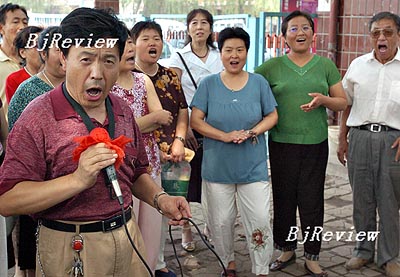
Even after over two years as an English instructor in north China, my five senses still get overloaded, sometimes pleasantly and sometimes appallingly. Edward T. Hall, a renowned anthropologist, defined culture by what we pay attention to and what we ignore while using our sensory apparatus. Anyone living in China immediately understands this vast gulf of preference.
The sense of smell inevitably evokes many Proustian memories. Here in China it can range for foreigners from gagging at open sewers to ardently following the pungent aroma of a street vendor's spicy Xinjiang lamb kebabs.
Amazing sights for expat's eyes seem ordinary to a Chinese. For example, in Beijing, surveying the endless hordes of harried travelers swarming and surging forth from the Beijing Railway Station is enough to make me feel faint. Watching a young Chinese father tenderly cuddling his infant daughter in the People's Park provokes a sentimental smile, even tears.
Our third sense--that of taste--represents powerful physical pleasure for most people. I know I'll never be able to come close to trying the infinite variety of foods and things categorized as Chinese foodstuffs.
The fourth sense--touch, the beloved sense--recalls for me here in China the pleasant, insistent embrace of a girlfriend guiding me across a busy boulevard, as well as the heavenly skin scrubbings I get at my local bath house every week.
The final sense, the sense of sound, either shatters or promotes peace and perception, for sound can assail or delight our sensitive ears. Significantly, in China noise is hard to define accurately. I especially despise drivers who bang belligerently on their car horns like undisciplined three year olds. Under their cultural premise, however, they are simply cautioning lesser citizens regarding their travel agenda. At the other end of the spectrum rests the eerie silence of my classroom of 55 graduate students, all unwilling to utter a word. Thus, although my five senses are all-acute and serve me well, it is the sense of sound that has jolted me into perceiving more of the great gap between the East and the West.
Foreigners perceive the Chinese as a noisy nation because public sound symbolizes prosperity and happiness here. Restaurants are packed with hungry, boisterous people all determined to eat well, loudly toast each other and express their joy at a noise level Westerners perceive as raucous and unsuitable. Chinese eateries routinely provide private dining rooms where strident singing and rowdy laughter reverberate through the neighboring walls. Many restaurants also supply karaoke equipment and/or hired musicians in traditional costumes to blare out serenades for guests.
Noise in China is also designed to attract attention. Sound signals listeners to either pay attention or to move, exemplified by those smug Audi chauffeurs. Along open storefronts, entrepreneurs set up podiums and makeshift stages. Bands and bad stereo systems blare out sappy songs, hopefully enticing shoppers inside the store to pump them up for a sale rather than just a look around.
Conversely, silence in China frequently signifies respect and modesty. In the classroom my students do not speak up even if they know the answer. No one wants to appear as either the class show-off or as the class dimwit. Hence, most Chinese professors simply lecture; students sit silently, absorbing and listening. Hospitals, clinics and dental offices are also quiet.
Another key difference rests in music. As a Western woman from New Mexico, I grew up in a multicultural sound environment. Latin music as well as rock resonated through my ears; I avidly listened to mariachis as well as Madonna. But only in church did I ever sing in public and only repetitive religious dirges. Unlike my passive Western music culture here Chinese people of all ages enthusiastically perform songs and play instruments publicly. Even my shy students will sing before they'll speak. People constantly clamor in restaurants for mics. Innumerable amateur musicians sit in parks, strumming ancient instruments and warbling tunes. This noise symbolizes emotional release, deep sentiment and a primal passion.
The enigmatic Easterner is no different in his heart than any Westerner. Tune into this and any complaints about Chinese culture will fade out, replaced by the exotic mellifluous melody of the peaceful Middle Kingdom.
The author is an American journalist living in Beijing | 